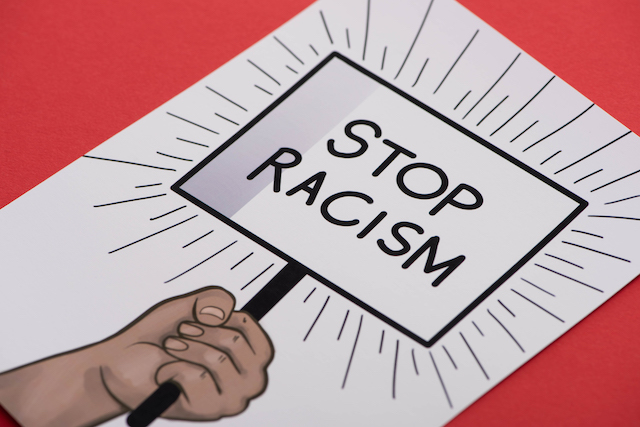
As the Black Lives Matter movement gains traction across the nation and the world, many of us are being called to use the skills we’ve learned to improve ourselves—such as speaking our truth, setting boundaries, and breaking the people-pleasing pattern—to improve our communities, our countries, and our world.
Those of us who are allies are conveniently positioned to have conversations about racial justice with our family members, friends, and coworkers. However, historically, many of us have balked at these conversations out of fear of our own awkwardness, others’ anger, or the possibility of creating rifts in relationships.
In the past, I’ve done a subpar job of asserting my boundaries with racist relatives. Instead of saying, “Hey, that thing you just said was really racist,” I usually opted to stay silent. I justified my silence with one or all of the following excuses:
- “I can’t change their mind.”
- “They won’t listen to me anyway.”
- “It’ll just start an argument.”
- “If this becomes a debate, I don’t know enough facts to justify my side.”
Now, I’ve come to understand that silence is violence—and that complicity in racism is racism.
Some activists assert that allies are most useful when we advocate for racial justice with our racist relatives. Others caution that getting into embittered arguments with racist relatives is a waste of energy—energy that could be better-devoted to creating real change for black folks.
Whether you choose to take an offensive stance (proactively engaging your racist relatives in conversations about race) or defensive stance (speaking out against racist relatives who make racist comments), knowing how to set boundaries with racist family members is critically important. When conversations become ineffective or toxic, we need to know how to stand in our power and create safety for ourselves.
These four tools can help you set empowered boundaries with your racist relatives and maintain the emotional energy you need to avoid burnout and continue engaging in anti-racist work.
1. Clarify the values that empower you to speak up.
When planning to have a difficult conversation, we can find motivation and strength in our values. Our values are our basic, fundamental beliefs that help us determine what is important to us.
For example, my core values include integrity and authenticity. I’m passionate about speaking from the heart, being honest, and acting in a moral manner.
When it comes to having difficult conversations with family members about race, I ask myself: What would it look like to act in integrity here? What would it mean to be fully authentic in this conversation? For me, this means not going silent in difficult conversations, addressing racist jokes and comments the moment they’re spoken, and holding firm to my beliefs, even in the face of others’ anger.
What are your core values? Honesty? Loyalty? Generosity? Compassion? Consider how those values align with your intention to speak out against racial injustice. When those conversations get difficult, find solace in the truth that you’re living in alignment with your fundamental beliefs.
(If you want to discover your most deeply-held values but aren’t sure where to begin, Scott Jeffrey’s Core Value List of over 200 personal values is a great place to start.)
2. Come prepared with specific language.
Boundary-setting discussions, especially with relatives, are among the most challenging conversations we can have. To reduce the pressure we may feel to summon the perfect words at the perfect time, it’s helpful to come prepared with a few key phrases we can use to set, and re-assert, our boundaries.
In a recent Instagram post, trauma and relationship therapist Jordan Pickell offered some excellent suggestions for how to tell someone you love that they’re being racist. It included suggestions like:
- In the moment, you can say “That is really racist/offensive/ignorant.”
- Set a boundary that you will not accept racist comments: “Don’t make racist jokes around me. If you do, I’m leaving.”
- Focus on the feelings/impact of their words: “When you say that, it makes me feel angry/disgusted/confused.”
- You can also go back to it after the fact: “What you said the other day isn’t sitting well with me.”
Remember that boundaries are statements of what we will or will not accept. The goal of a boundary isn’t necessarily to change another’s behavior, but to create safety and integrity for ourselves. The most perfectly crafted boundary might not stop Uncle Joe from making racist jokes, but it can protect you, your children, your mental energy, or your home.Examples of simple boundaries in this vein include:
- “I will not speak to you when you make racist comments.”
- “If you make racist comments, I will hang up the phone.”
- “If you continue to make racist comments, I will not bring my children to your home.”
- “I cannot tolerate your racism and I no longer want to be in touch with you.”
3. Use the broken record technique.
When our boundaries are met with defensiveness, we may find ourselves drawn into circular and long-winded arguments. Your relatives may say,
- “You can’t tell me what to do!”
- “You’re taking this too seriously. Lighten up.”
- “Show me the numbers. Prove it.”
Remember: you don’t need to justify your boundary. You don’t need to explain yourself, to recite the most recent statistics on police brutality, or to appeal to this person’s heart of hearts that racism is actually really, really bad. Instead, try the broken record technique.
Created by Richard Lavoie, a national expert on classroom management, the broken record technique is a simple yet effective way to reassert your boundary without getting mired in distracting arguments. To deploy this technique, simply repeat the same message three times, calmly yet assertively—regardless of how the recipient responds.
Here’s an example:
You: “Bob, I will not participate in conversations with you when you’re being racist.”
Bob: “Oh come on, lighten up! You’re taking this too seriously.”
You: “I will not participate in conversations with you when you’re being racist.”
Bob: “Racist? That’s ridiculous. You know what’s really racist? Affirmative action.”
You: “I will not participate in conversations with you when you’re being racist.”
Bob: “Alright, whatever. I’m outta here.”
As you can see, when you repeat the same message calmly and assertively, you simultaneously limit Bob’s power while preserving your own mental and emotional energy.
4. Practice post-boundary self-care.
Especially if this is your first time addressing racism in your family, setting these boundaries may feel particularly difficult. It may feel like an enormous emotional upheaval—and it is! You’re breaking a silence that you’ve held for months, years, or even decades, and that is serious emotional work.
After setting your boundary, you may feel fear, guilt, or shame, even though, intellectually, you know that setting this boundary was important and righteous. If you grew up in an environment where you were punished, harmed, or neglected when you disagreed with a family member, learning the art of honest expression in the family is a radical act.
Post-boundary self-care helps you avoid burnout and replenish your resources so that you can continue engaging in anti-racist activism in your family and community.
Personally, I really need rest after a conversation like this. My nervous system gets overloaded and frayed, and a nap or cozy evening at home is an important way to come home to myself. If I’m feeling guilty, I contact a trusted friend who can reaffirm the righteousness of my boundary and keep me on the course.
When we set boundaries with our racist relatives, we create personal, zero-tolerance zones where we are no longer complicit in our relatives’ racism. It is difficult and demanding work, but it is absolutely necessary if we are to claim true allyship with the black folks who are fighting for their right to exist safely in this world.
About Hailey Magee
Hailey Magee is a Codependency Recovery Coach who helps individuals conquer people-pleasing, set empowered boundaries, and master the art of speaking their truth. She has worked with over 100 clients from the US, Canada, Ireland, France, South Africa, and more. Sign up for a complimentary consultation to learn how coaching can help you live from a place of authenticity and inner freedom. You can follow Hailey on Facebook and Instagram, or visit www.haileymagee.com.
- Web |
- More Posts













 Though I run this site, it is not mine. It's ours. It's not about me. It's about us. Your stories and your wisdom are just as meaningful as mine.
Though I run this site, it is not mine. It's ours. It's not about me. It's about us. Your stories and your wisdom are just as meaningful as mine.
Thank you Hailey! Silence is violence, what a powerful line. I think all of us have a moral duty to talk about racism, stand up to racism and help heal racism. Let’s use our self-development tools to work on this issue. We cannot stand by while others are suffering in our communities.
Agreed, @VishnusVirtues:disqus! Thanks for your words!
EVERYONE has a right to their place in this world, WHATEVER the colour of their skin ( or their hair for that matter ) and there are many colours.
Yes ALL lives matter!
I actually disagree with this approach for white folks. As a white person, it’s my job to engage and educate my white family member who is being racist. If I don’t, who will? If I say “I won’t have this conversation when you are being racist” and they walk away, how does that help folks of color who encounter that person? It just puts the burden on them to educate that person.
I’d recommend reading “So You Want To Talk About Race” by Ijeoma Oluo for more on this.
@Lizalopoli:disqus I hear you, and I agree that of all the folks out there, we as allies are BEST positioned to have those conversations with our family members. However, many activists assert that white allies are most useful to the racial justice movement when we spend our energy doing things like calling Reps and Senators, making phone calls, participating in protests, etc. Conversations with family members who are unwilling to have an actual dialogue can be a huge drain on one’s energy and resources — resources that could be better spent participating in anti-racist efforts elsewhere.
Yes. It drains my energy and it’s usually fruitless with certain people. People’s unconscious fears are POWERFUL. You can plant a seed, for sure, but when you are subjected to attacks (as I have been), its draining beyond anything. I’d rather save my energy for real action than someone who doesn’t want to hear what I have to say.
@disqus_p5nkqXPhd4:disqus yes, exactly my stance as well. I would rather conduct anti-racist work in areas where I’m more likely to have real impact.
“I actually disagree with this approach for white folks.”
In other words, you’re racist. Got it. In other news, if you virtue signal any harder you’ll get a hernia.
Good article. Whenever any of my relatives derogate white people as “privileged” or “oppressive” I remind them in very clear terms just how ignorant and hateful they are.
Calling a white person “privileged” is neither ignorant or hateful. Our privilege is intrinsic… We’re born with it, because we were born into a culture that’s easier to live in as a white person. Saying that white folks have oppressed folks of color is neither ignorant or hateful. It’s actually just… factual.
Calling anyone anything, when you have no clue about their history or their lived experience, based solely on their color, is both ignorant and hateful. It’s the very definition of ignorant and hateful. You just can’t see that because your imagined virtue blinds you to the hate you’re propagating.
Saying that “white folks have oppressed folks of color” is an ignorant partial truth. Folks of color have oppressed folks of color. White folks have oppressed other white folks. What? Did you think slavery started in America? Did you think it was just blacks who were enslaved?
You seriously need to crack some history books before you present yourself as an authority on these things.
Such ignorance and lies in your post.
It’s ok to be white
@disqus_NMtpUCr9GX:disqus, no one ever said it wasn’t ¯_(ツ)_/¯
Yes it is
Thank you, thank you, thank you. I’ve been really struggling with this and beating myself up for not being stronger with my sibling. I have been looking for an article like this and this is exactly what I needed. I always turn to Tiny Buddha when struggling with an issue. I can’t thank you enough for this. I’ll read it over and over again to continue on this journey.
I’m so glad this resonates with you, @disqus_p5nkqXPhd4:disqus. As you might imagine, I’ve been struggling with this in my own family, and I recently realized (as you stated above) that I need to set firm boundaries with these relatives so that I can invest my energy in anti-racist work in areas where it’s more likely to have an impact. You’re not alone in this!
Thank you Hailey! Excellent tips. As a white woman, I support and stand with Black Lives Matter and refuse to be silently polite anymore when I hear/ see/ witness racism no matter it’s source. Your tips will help me to keep my sanity as I navigate these conversations. Yes, it’s easier to not engage, but it’s not the right thing to do. Let’s acknowledge America’s racism, past and very much present, and work toward making amends. We’re all Americans and in this TOGETHER. All of us, no matter our race, have more in common with each other than we have differences. How much money we have seems to divide us the most as it dictates how we spend our time and energy. Why we continue to hate on each other is hard to understand. You’re only as strong as your weakest link. And until you’ve walked in another’s shoes…Let’s stand up and speak up so we can all rise up together. ✊✊🏽✊🏿
So beautifully put, @disqus_ELEvxXc2XX:disqus! Thank you for your words!
Eljae just curious how you react to the interracial violent crime statistics which shows black on white violent crime and rape far outweighs white on black violent crime and rape? The real racism epidemic comes from black people onto white people, and the fact that black people cry victim with those stats is an attempt at building black supremacism, and screams of black fragility.
💜 It’s time to stand up for peace, justice and equality! We can make a difference if we stand shoulder to shoulder, TOGETHER! For real change. For fairness and righteousness… it starts here and the TIME IS NOW! Speak the truth and make a difference! Every individual makes a difference!
As a Black American, I appreciate what this article is trying to do. I thought that Tiny Buddha was going to ignore the issue all together like many spiritual platforms have chosen to do. Which personally would have made me feel that this site did not address an important part of my identity. I am grateful that this article has at least started some kind of conversation. Thank you Hailey Magee.
Thanks for sharing, @cla35t:disqus. I was really glad that Lori & Tiny Buddha were open to publishing the piece, too. It’s been disappointing to see how many healing/spiritual platforms have remained silent.
BLM is a black supremacist terrorist organization. You supporting it and acting like you stand against racism is rich.